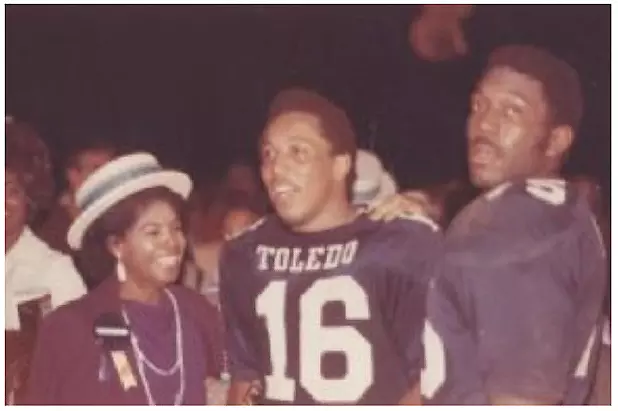Football
During the last century, Toledo was home to two Professional Football Hall of Fame players and an undefeated college quarterback. All three of these players were African Americans, who while fighting racism, would become innovators in professional football.
Chuck Ealey
Chuck Ealey did not lose a football game from 1965 through 1971, a span of 65 games at Notre Dame High School and the University of Toledo. Even with this record of success, Ealey was not recruited outside of Ohio (only Miami University and the University of Toledo offered him scholarships) and lightly recruited by the NFL as a running back (which steered away from black quarterbacks).
Not desiring to move from the position that he excelled at, Ealey chose to ply his trade in the Canadian Football League. He was drafted by the Hamilton RoughRiders, and quickly became part of something that he hadn't been a part of since before high school: losing. But this did not deter him and he picked up where he left off at Toledo, leading the RoughRiders to 11 straight wins, an 11-3 record, and a Grey Cup championship.
Ealey would never match the numbers that he put up in his first season, but he continued to play in the CFL for six more seasons, concluding his career in 1978 after suffering a collapsed lung while playing for Toronto. Ealey would retire having never been able to fulfill his dream of playing in the NFL.
In 2006, a movement began at the University of Toledo to get Ealey into the College Football Hall of Fame. The reason for his exclusion was not due to race or oversight, but because of the rules for election that called for the player to either be a First or Second Team All American by one of the major voting bodies while playing college football. The "Induct Chuck" movement, through the Chuck Ealey Foundation, is currently working to get the rules for admission changed so players such as Ealey can be admitted into the Hall of Fame.
Today, Ealey is a motivational speaker for Investors Group, based in Mississauga, Ontario, a suburb of Toronto. He currently lives in Brampton, Ontario.
Jim Parker
Jim Parker was born and raised in Macon, Georgia in 1934. Parker and his family later moved to Toledo, where he attended and played football for Scott High School. While at Scott, Parker was recruited by Woody Hayes and Ohio State, where he would go on to win the Outland Trophy (best lineman) in 1956. Parker anchored the Ohio State running game to a perfect season and a national championship in 1954, opening up holes for Heisman winner Howard Hopalong Cassady (Parker finished eighth in the voting). Parker also earned All American honors twice during his career with the Buckeyes.
Parker was be the first draft choice of the Baltimore Colts, where he spent most of his career protecting the great Johnny Unitas from various positions. Parker would earn All Pro accolades as both a left guard (1962-1965) and tackle (1958-1962), during his illustrious career.
Jim Parker was inducted in to the Professional Football Hall of Fame in 1973, his first year on the ballot. Parker would be the first full time offensive lineman to ever earn that honor. He died in 2005 at the age of 71. View the New York Times obituary here.
Emlen Tunnel
Emlen Tunnel was born in Bryn Mawr, Pennsylvania in 1925. Tunnel starred at Rador High School in Rador Township, PA and later moved on to the University of Toledo. While at UT, Tunnel broke his neck. Told that he would never play competitive athletics again, Tunnel nevertheless led the Rockets to the NIT finals in 1946. Due to his injury, Tunnel was not able to enlist for the Army or Navy service in World War II. He would, however, later be accepted into the Coast Guard.
After the war, Tunnel transferred to the University of Iowa, where his career took off. After the 1947 season, Tunnel left school and requested a tryout with the New York Giants.
Tunnel, the Giants’ first African American player, would go on to be an important part of Defensive Coordinator Tom Landry's "umbrella" defensive scheme that was utilized by the team, which employed six defensive backs. In the 1952 season, Tunnel had more yards returning interceptions and kick returns than the NFL rushing leader (924 to Dan Towler's 894).
In 14 seasons, Tunnel recorded 79 interceptions, a record that stood until Paul Krause of the Minnesota Vikings broke it in 1979. Tunnel played in nine Pro Bowls, made All-NFL six times, and was later voted the All-Time best Safety in 1969.
After his final year in Green Bay and his playing days had ended, Tunnel would later become the first African American Assistant Coach when he took the position with the Green Bay Packers and Vince Lombardi. He was inducted into the Professional Football Hall of Fame in 1967.

